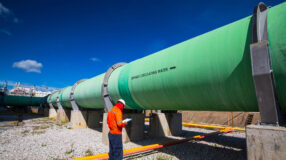To download the oral (below) and written statment, click here.
Good morning Chairman Murkowski, Ranking Member Cantwell and members of the committee. My name is Donald Santa, and I am president and CEO of the Interstate Natural Gas Association of America, or INGAA. Our members transport the vast majority of the natural gas consumed in the United States through a network of approximately 200,000 miles of interstate transmission pipelines.
Thank you for the opportunity to share INGAA’s perspective on the evolution of the nation’s natural gas transmission pipeline infrastructure and the lessons learned from that experience. My perspective on this subject is informed not only by my current role, but also by my experience as a member of the Federal Energy Regulatory Commission.
My testimony today will summarize four recommendations.
First, recognize that enhancements to the existing natural gas pipeline network will continue to be needed.
While the U.S. has a robust, well-developed natural gas pipeline network, sources of natural gas supply and consumption patterns will continue to evolve. Consequently, the US will continue to need a flexible and responsive natural gas pipeline network that can adapt to meet the public interest.
This evolving situation is illustrated by the recent emergence of the Permian Basin as a significant source of associated gas that is close to markets on the Gulf Coast and in Mexico. Additional pipeline capacity will be needed to bring this gas to market.
Second, value the Natural Gas Act framework.
The Natural Gas Act framework has been remarkably durable and should not be upset. The choice by Congress in 1938 to provide the Federal Power Commission (and its successor, FERC) with latitude to interpret key statutory terms has enabled the commission to adapt efficiently to the evolving market and public policy imperatives.
Congress vested FERC with exclusive authority to authorize the construction of an interstate natural gas pipeline found to meet the public convenience and necessity. This exclusive authority is important for two reasons. First, FERC exercises its authority in the national interest. Second, while other federal agencies have mandates to issue impact-specific permits connected with a proposed pipeline, only FERC has the project-approval mandate.
Finally, the temptation to dictate FERC’s agenda via prescriptive tweaks to the NGA should be resisted.
Third, the permitting process must be coordinated.
While FERC has overall responsibility for reviewing applications to construct new interstate natural gas pipelines, other federal agencies – and, in some cases, the states — review and permit discrete activities associated with pipeline construction. Experience demonstrates that the pace of action – or inaction – on these other permits can delay and frustrate the timely and predictable approval of pipeline projects.
Congress’ attempt to address this situation in the Energy Policy Act of 2005, by strengthening FERC’s role as the lead permitting agency for interstate natural gas pipelines, has not been entirely successful. We encourage the enactment of legislation now pending before Congress that would improve this process incrementally, such as the House-passed H.R. 2910, the Senate-introduced S. 1844, and parts of S. 1460, introduced by this committee’s chairman and ranking member.
These goals also are being advanced through executive branch reform initiatives, such as Executive Order 13807, on Establishing Discipline and Accountability in the Environmental Review and Permitting Process for Infrastructure.
Fourth, cooperative federalism must be restored.
As noted, federal law assigns to the states certain permitting responsibilities. For many years, this worked smoothly as states reviewed applications for permits required by federal law and imposed reasonable conditions to protect their resources. Now, however, states are using this authority to dictate national energy policy. Specifically, the State of New York is attempting to use its authority under section 401 of the Clean Water Act effectively to veto FERC’s determination that a pipeline project is in the public convenience and necessity.
We respect the rights of states to protect the resources within their borders and support the “cooperative federalism” framework upon which many of these environmental statutes are built. This, however, is about more than just the respective roles of federal and state authority, because one state’s abuse of its role in this relationship can affect the ability of other states and their citizens to enjoy the benefits of interstate commerce. That is not cooperative federalism.
We do not believe that this result was intended by Congress. We encourage Congress to remedy the situation by providing guidance as to the appropriate role of a state under section 401 and by providing meaningful recourse should a state abuse its authority.
In conclusion, the United States has benefitted greatly from a natural gas transmission pipeline network unlike any other in the world. These benefits include lower energy prices for consumers and industry, cleaner air through the displacement of less benign fuels, and greater energy security. This would not have been possible without the pipelines that link the suppliers and consumers of natural gas.





